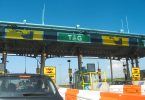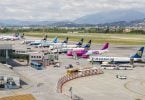Berlin is now one of Europe’s most popular urban tourist destinations, but the thousands of young travelers visiting the German capital are looking for more “authentic” experiences beyond the usual tourist spots and museums. In at least one neighborhood, that has brought them into conflict with the locals.
On a balmy summer evening in the Berlin borough of Kreuzberg, people are starting to congregate on the Admiralsbruecke, a romantic 19th-century bridge with intricate iron work, gas-lit lamps, cobblestones and a gorgeous view of the canal, a tributary of the Spree river. Recently listed on a tourist website as the bridge “where the locals go,” the Admiralsbruecke has become hugely popular with 20-somethings who fly in on discount airlines searching for the “real” Berlin. After dark, there are street musicians, people hanging out and lots of imbibing.
Pete Stark from Melbourne, Australia, was so impressed with the bridge that he became a regular during his brief vacation.
“We rode past the bridge and saw a whole bunch of people drinking and thought we’d come along and have a few beers,” he said. “We’ve been here maybe three times. It’s a lot of fun — lot of people here, a good vibe.”
Local resident Rinaldo Kellner, whose ground-floor apartment is a stone’s throw from the bridge, says early on in the night, the bridge is a wonderful place to sit and take in the summer air and sights. He calls the din emanating into his garden “part of the fabric of urban life.” But the father of two says the scene often turns grim after midnight — especially on weekends — when he and his family would rather be sleeping.
“As the night progresses, the noise worsens,” he says. “People start to holler, smash their beer bottles. I have to shout at the people urinating in my garden. In the morning, there’s garbage everywhere.
“Ridiculous things happen, like last week, when four young drunk American guys thought it would be fun to climb the trees in front of my house and flop into my yard. Do I really want to have to witness that at 2 in the morning?”
Residents are so annoyed with the drunken antics, the broken glass and the electric music well into the wee hours that the local authorities have brought in a team of professional mediators to create a dialogue.
“We find that when we are on the bridge, we can walk up to the people and at least 80 percent are open for discussion, and they say, ‘We understand the situation,’ ” said Doris Wietfeldt, a member of the team of mediators. “We know that music is a nice thing, but at the same time people have to sleep at night.”
Even Berlin’s mayor has stepped in to try to help. The idea, Wietfeldt says, is to find a solution together. So far, none is forthcoming.
But tourism is a major pillar of Berlin’s economy, pumping more than 9 billion euros into the city every year. The number of tourists has more than tripled over the past 15 years.
Sedat Uyulgan’s business is booming, selling cold beer from his news kiosk near the bridge. He says Berliners need to make peace with their city’s popularity.
“Berliners need to learn to accept tourists. Berlin is a poor city. We need them,” he says. “But look at the upturn here in Kreuzberg. Every corner has a beautiful cafe, it’s multicultural. What more do you want?”
Well, for starters, many locals want a good night’s sleep and a more coherent plan from city hall for how Berlin manages its growing tourist industry.





















